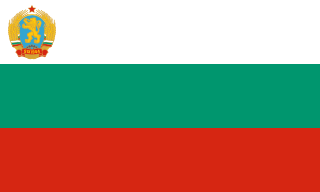
Poland competed at the 1980 Summer Olympics in Moscow, USSR. 306 competitors, 232 men and 74 women, took part in 162 events in 21 sports.

Bulgaria competed at the 1964 Summer Olympics in Tokyo, Japan. 63 competitors, 56 men and 7 women, took part in 56 events in 9 sports.

Bulgaria competed at the 1960 Summer Olympics in Rome, Italy. 98 competitors, 89 men and 9 women, took part in 66 events in 12 sports.
The Greco-Roman lightweight was one of four Greco-Roman wrestling weight classes contested on the Wrestling at the 1908 Summer Olympics programme. Like all other wrestling events, it was open only to men. The lightweight was the lightest weight class, allowing wrestlers up to 66.6 kilograms (147 lb). Each nation could enter up to 12 wrestlers.
At the 1920 Summer Olympics, ten wrestling events were contested, for all men. There were five weight classes in Greco-Roman wrestling and five classes in Catch as Catch Can, predecessor to freestyle wrestling. The competitions were held from Monday, August 16 to Friday, August 20, 1920 (Greco-Roman) and from Wednesday, August 25 to Friday, August 27, 1920 (freestyle).
At the 1928 Summer Olympics, thirteen wrestling events were contested, for all men. There were six weight classes in Greco-Roman wrestling and seven classes in freestyle wrestling. The freestyle competitions were held from July 30 to August 1, 1928 and the Greco-Roman events were held from August 2 to August 5, 1928.

Finland competed at the 1920 Summer Olympics in Antwerp, Belgium for the first time as a fully independent state. It did compete at the previous Olympics, however, only as the Russian-dependent Grand Duchy of Finland. 63 competitors, 62 men and 1 woman, took part in 51 events in 9 sports.

Denmark competed at the 1920 Summer Olympics in Antwerp, Belgium. 154 competitors, 150 men and 4 women, took part in 66 events in 14 sports.
Kazım Ayvaz was a Turkish Olympic medalist sports wrestler in the lightweight class and a trainer. He won the gold medal in Men's Greco-Roman wrestling at the 1964 Olympics and became world champion twice.

Estonia first competed as a nation at the 1920 Summer Olympics, two years after the country declared independence from the then warring Russian and German Empires in 1918. The Estonian National Olympic Committee was established in 1923. The first Winter Olympics for independent Estonia were the 1928 Winter Olympics. Estonian athletes took part in the Olympic Games until the country was invaded and occupied by the Soviet Union in 1940. The 1980 Summer Olympics sailing regatta was held in Tallinn, Soviet-occupied Estonia. Since the end of the Soviet occupation in 1991, Estonia has participated in all Olympics. Estonia has won most of its medals in wrestling (11), weightlifting (7), cross-country skiing (7) and athletics (6).
The men's Greco-Roman 68 kilograms at the 1996 Summer Olympics as part of the wrestling program were held at the Georgia World Congress Center from July 20 to July 21. The gold and silver medalists were determined by the final match of the main single-elimination bracket. The losers advanced to the repechage. These matches determined the bronze medalist for the event.
The men's Greco-Roman featherweight was a Greco-Roman wrestling event held as part of the Wrestling at the 1920 Summer Olympics programme. It was the second appearance of the event. Featherweight was the lightest category, including wrestlers weighing up to 60 kilograms.
The men's Greco-Roman middleweight was a Greco-Roman wrestling event held as part of the Wrestling at the 1920 Summer Olympics programme. It was the third appearance of the event. Middleweight was the median category, including wrestlers weighing up to 75 kilograms.
The men's Greco-Roman light heavyweight was a Greco-Roman wrestling event held as part of the Wrestling at the 1920 Summer Olympics programme. It was the third appearance of the event. Light heavyweight was the second heaviest category, including wrestlers weighing up to 82.5 kilograms.
The men's Greco-Roman heavyweight was a Greco-Roman wrestling event held as part of the Wrestling at the 1920 Summer Olympics programme. It was the third appearance of the event. Heavyweight was the heaviest category, including wrestlers weighing over 82.5 kilograms.
The men's freestyle lightweight was a Catch as Catch Can wrestling, later freestyle, event held as part of the wrestling at the 1920 Summer Olympics programme. It was the third appearance of the event. Lightweight was the second-lightest category, and included wrestlers weighing up to 61 kilograms.
The men's Greco-Roman lightweight was a Greco-Roman wrestling event held as part of the Wrestling at the 1924 Summer Olympics programme. It was the fourth appearance of the event. Lightweight was the third-lightest category, including wrestlers weighing 62 to 67 kilograms.

Two athletes, both men, competed under the Egyptian banner at the 1906 Intercalated Games in Athens, Greece, and took part in five events across three sports. Arthur Marson, a track and field athlete, did not place within the top six in the 5 mile and failed to finish the marathon. Eugenio Colombani competed in cycling and Greco-Roman wrestling, but did not reach the finals of either event. Egypt, therefore, did not win any medals at the Games.
Rudolf Watzl was an Austrian Greco-Roman wrestler who competed in the 1906 Intercalated Games in Athens, Greece and won a gold and a bronze medal.
The Men's Greco-Roman Lightweight at the 1968 Summer Olympics as part of the wrestling program were held at the Insurgentes Ice Rink. The weight class allowed wrestlers of up to 70 kilograms to compete.






